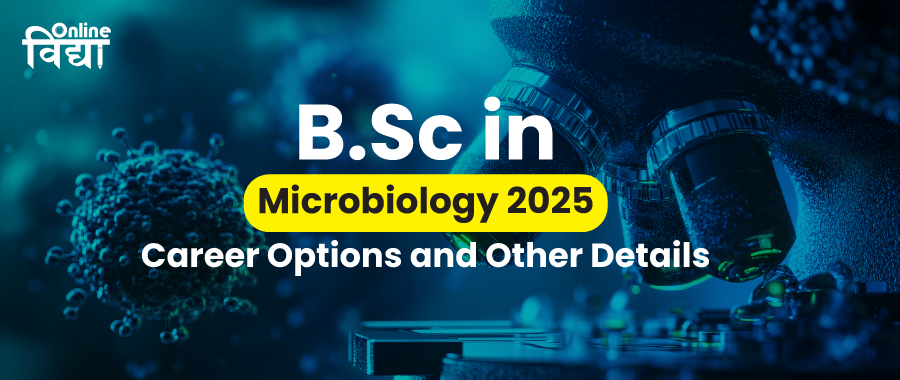Specializations
Courses Available
Courses

BSc in Microbiology 2025: Career Options and Other Details
BSc in Microbiology 2025: Career Options and Other Details,Dec 26, 2024
Online B.sc Program
Dec 26, 2024
3543 Views
- Share:
The 3-year BSc degree program in Microbiology provides students with the knowledge of bacteria, viruses, fungi, and parasites. It also focuses on research, development, and education, ensuring that students gain a solid understanding of microbiology. This program effectively balances theoretical knowledge with practical experience.
Course Highlights
Particulars | Details |
Course Duration | 3 years |
Course Level | Undergraduate |
Course Eligibility | 10+2 pass from a recognized university with PCM |
Course Accreditation | UGC, NAAC, & AICTE |
Course Fee Range | INR 3 to 8 LPA |
Top Recruiters | Hospitals, Research Institutes, Pharmaceutical Businesses, and Government Organizations |
Salary Range | INR 2.5 to 10 LPA |
Job Profiles | Research Associate, Biomedical Scientist, Microbiologist, Pharmacologist, and Ecologist |
Benefits of BSc Microbiology
BSc Microbiology provides the following advantages:
- A degree in microbiology can lead to some extremely special job prospects such as:
- Mycologists,
- Cell biologists,
- Virologists,
- Bacteriologists,
and many others are among the diverse range of practitioners. Similarly, after earning a PG, one might enroll in PhD courses.
- Most microbes have dynamic, not static, genetic makeup. Thus, it is possible that they might be explored. Microbiologists never give up exploring microbes to enhance their understanding of the principles in infectious processes, the function of bacteria in environmental transformations, and the effects of microbes in food, among other themes.
- In India, the average salary of microbiologists is around INR 310,000 per annum. For experienced senior microbiologists with more than ten years of experience, the annual salary could be around INR 6,32,000.
Whom to examine this?
- Candidates who are interested in reading microorganisms and their behaviors need to pursue this route.
- A profession as a microbiologist requires non-stop studies; hence people with a penchant for studies ought to opt for this route.
- Aspirants must additionally have a good understanding of the significance of food protection and how bacteria affect food production. Only the enthusiastic and honest should take this path.
- This course needs the player to show leadership and duty inside the laboratory. Individuals who have exact management qualities should attend the route.
- Because the Microbiology route continues to be taken into consideration in consultant training in India, candidates must be extra careful with their options.
Eligibility Criteria
Applicants who want to pursue admission in the BSc Microbiology course are required to have fulfilled the minimum eligibility standards as given under:
- Passed Class 12 or equal qualifying exam from any diagnosed board with a minimum of 60% marks.
- Applicants should have cleared Physics, Chemistry, Biology/Zoology/Botany as obligatory topics throughout Class 12.
Some of the fine faculties and universities offering this Bachelor's degree program have entry exams. Colleges/universities can be able to use these exams to assess the information and competencies of the students so one can be used to make alternatives.
- NPAT (National Test For Programs After Twelth)
- CUET (Central Universities Entrance Test)
- CUCET (Central Universities Common Entrance Test)
- SET (State Eligibility Test)
Course Curriculum
Semester 1
| Semester 2
|
Semester 3
| Semester 4
|
Semester 5
| Semester 6
|
Career Options
Microbiologists are in splendid demand these days in scientific research, excellent manipulation, and biotechnology fields. Many graduates achieve jobs as researchers in universities, pharmaceutical businesses, and bioscience establishments.
- B.Sc. Microbiology graduates additionally flow into medical or technical operating environments that don't involve studies. There are numerous task possibilities to be had for the ones interested in a career in microbiology. Graduates in Microbiology will locate employment in a whole lot of regions, consisting of authorities and personal hospitals, food industries, studies and improvement groups, chemical industries, and pharmaceutical organizations.
- B.Sc. Microbiology graduates can pursue a career as a technology creator, authoring papers for expert microbiologists.
- A biochemist investigates the chemical components of organic methods. He/she works on manipulating numerous molecules observed in the human frame, along with DNA, RNA, and enzymes, to analyze and alter biological strategies.
- A cell biologist researches the diverse capabilities, structure, and physiological and metabolic characteristics of a cell. This discipline enables engaging in research in a lot of fields, mainly the study of particular cells or unicellular organisms.
- An immunologist is an expert in immunology who commonly deals with several immune-related troubles. They also contribute to the study of the development of novel medications that adjust an organism's fitness.
FAQs
Is B.Sc microbiology a feasible professional path?
BSc Microbiology graduates have very attractive career opportunities in an extensive range of industries. Recruiters are pharmaceutical and biotech companies, medical testing laboratories, food and dairy businesses, agriculture, environmental consulting corporations, and research establishments.
Can I take a look at microbiology without NEET?
Yes, there are many commonplace admission assessments to get admitted to Microbiology Colleges in India, a number of which are listed under: CUET: Common University Entrance Test is a country-wide-stage entrance exam administered by means of the National Testing Agency (NTA) for admission to various undergraduate and graduate programs.
Do we get jobs after finishing our BSc in microbiology?
A profession in Microbiology Science offers many opportunities in healthcare areas including diagnostics, hospitals, prescribed drugs, medical research, and genetics. Science students ought to look into such areas to study the many expert obligations and job possibilities available to them.

Meet Our Counselling Experts
Get 100% Free Career Counseling




PlacementPartners










Schedule Your 30 min Couselling Session With Today!!
Select a Date of your choice :
You Have Selected Slot on .

